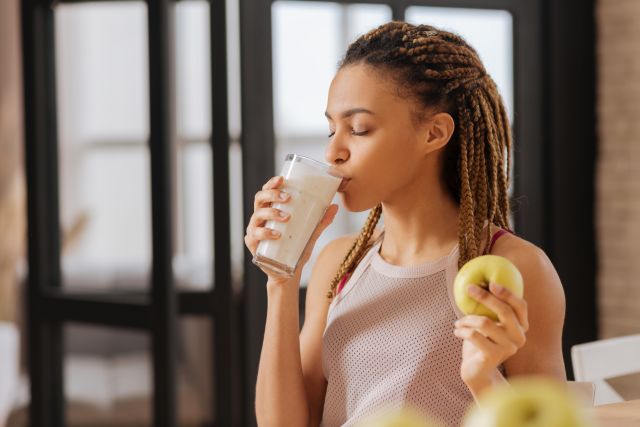Updated on October 14, 2022.
You probably know that if you want to build muscle—and maintain it, particularly as you age—you need to go beyond the 150 minutes per week of moderate-intensity aerobic exercise that’s typically recommended. That means mixing at least two sessions of strength training into your weekly routine.
Strength training basically means any exercise where you set your muscles against a resisting force (which is why it’s also known as resistance training). That could be lifting weights, using elastic bands, or pushing or pulling your body against gravity, such as by doing squats, push-ups, or pull-ups.
As crucial as it is to challenge your muscles to build and maintain their strength, it’s equally important to feed your muscles the nourishment they need to grow. And having a protein-rich snack after strength training can give that muscle-building process a boost.
If you’re new to strength training, you might feel it’s necessary to invest in high-tech protein powders and muscle-building formulas. Not so, suggests research. The path toward healthy, replenished muscles may be as simple as a trip to your refrigerator.
Muscle growth, explained
To understand how to nourish your muscles, it helps to know how they grow.
When you perform resistance exercises, two important processes occur: muscle breakdown and muscle synthesis. When you challenge your muscles sufficiently, they begin to break down at a cellular level. That may sound scary, but the good news is that just as muscles break down, they rebuild themselves—stronger and often bigger.
To build muscle, these processes of breakdown and synthesis have to happen in balance: Your muscles need to be fed as they are broken down. The key nutrients that help muscle synthesis take place are carbohydrates and protein. The building blocks of proteins are called amino acids.
Many foods contain carbohydrates and protein, but not many contain the right range of amino acids to foster muscle growth while also being easily digested and absorbed into the body.
Milk for muscle building
Every protein source is made up of different amino acids, but it’s the type and proportion of amino acids in milk that sets it apart. Milk contains all nine of the so-called “essential” amino acids, named as such because they are not created naturally by the body and must therefore be acquired through diet.
One of those essential amino acids, leucine, is especially helpful for muscle growth. Leucine isn’t produced by the body—it must be consumed from protein sources like meat, milk, eggs, and soy. Milk may be a particularly good option after a workout because it’s a high-quality, easily available protein that doesn’t require cooking or preparation. In addition to leucine, It contains electrolytes, carbohydrates, and vitamin D, which is vital for muscle growth.
A range of studies have found that drinking milk after working out can build muscle mass. A 2019 meta-analysis in Advances in Nutrition reported that dairy intake increased muscle mass among older adults by 0.013 kilograms.
A 2021 article in Frontiers in Nutrition found that people who exercised and drank milk increased strength by about 20 percent more than participants who exercised but didn’t consume diary. Study participants were healthy adults over the age of 50 who participated in three workouts a week for three months, with strength measured via leg-press machines. The dairy consumers drank milk two times a day, one cup at breakfast and another cup either at lunch or post-workout.
A 2007 study in the American Journal of Clinical Nutrition looked at people drinking about two cups of milk, split into one drink immediately after a workout and another an hour later. The participants worked out five days a week for three months. The milk group gained 2.5 pounds more muscle mass by the end of the study than did people drinking soy. Milk drinkers also lost two pounds of fat, as opposed to no fat loss in the soy group.
Getting the protein you need
If dairy isn't your thing or you’re lactose intolerant, you can still reap some muscle-building rewards by consuming other proteins after a workout.
In the 2007 study, milk bested soy milk for muscle-building benefit, but the soy milk drinkers did gain more muscle than the people who didn’t consume either. And while there may be benefit to drinking protein shakes—such as those made with whey protein or soy protein—for many people, good old fashioned milk may be all you need.
Whatever source you choose, just make sure you have protein in your system before working out and remember to include it within two hours after exercise for best results.
And be sure to get enough protein each day overall—especially if you are exercising regularly. For men, that is about 56 grams; for women, it’s about 47 grams. (This is based on the recommended daily dietary allowance of 0.36 grams of protein per pound of body weight.)
Older adults over 65 years of age may need more protein, since their bodies don’t use it as efficiently as the bodies of younger people. That means they may need upwards of 0.45 to 0.54 grams of protein per pound each day, which works out to about 68 to 81 grams of protein.
One 12-ounce glass of reduced-fat 2% milk contains just over 12 grams of protein. Pouring a tall glass can help your muscles get on their way to recovering and rebuilding from your workout.







